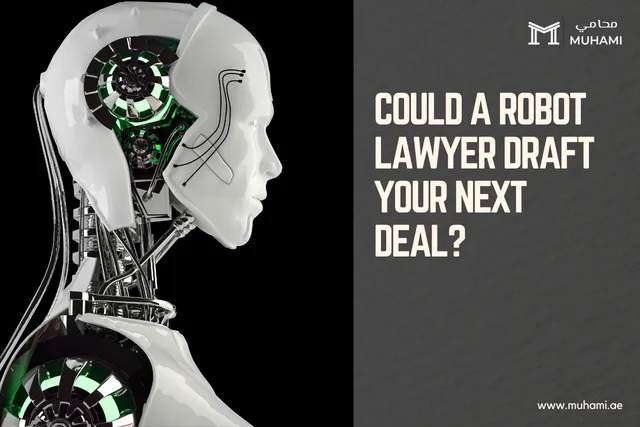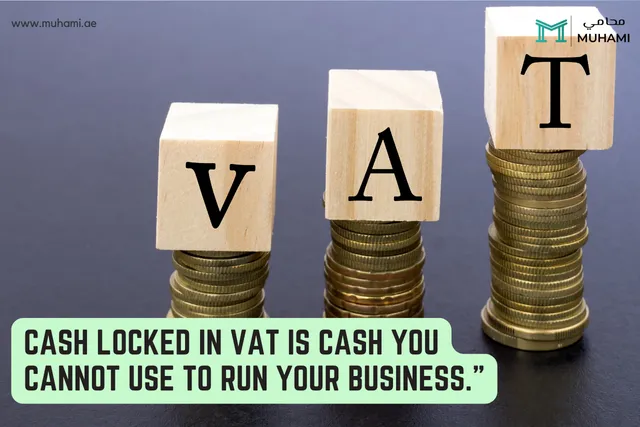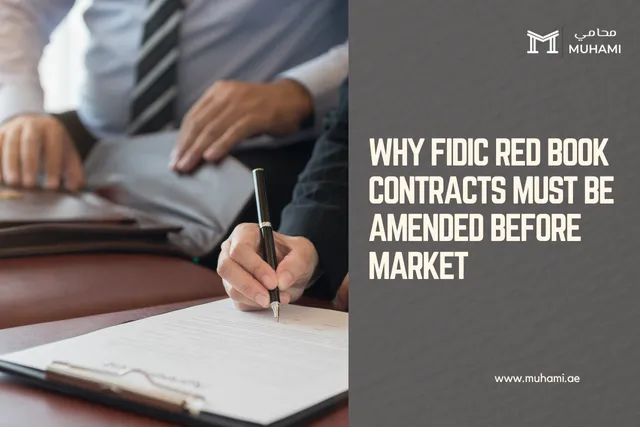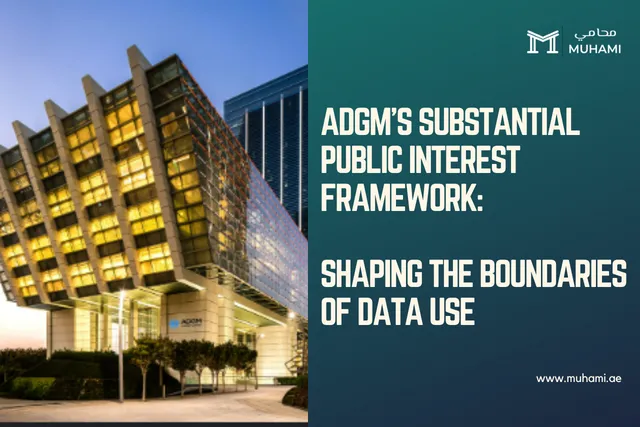AI and Contracts: Could a Robot Lawyer Draft Your Next Deal?

At a co-working space in Dubai Marina, a startup founder leans over her laptop. Instead of calling a lawyer to draft a contract with her new investors, she opens ChatGPT, types a prompt, and within minutes has a polished “Shareholders’ Agreement” in front of her. She emails it across and thinks: Why spend thousands on legal fees when AI can do it in seconds?
It’s a scenario that feels futuristic but is already unfolding. Across boardrooms and startups in the UAE, artificial intelligence is reshaping how businesses operate—and legal work is no exception. But can a robot lawyer really draft your next deal? And more importantly, should you trust it?
The Rise of AI in the Legal World
Artificial intelligence has leapt from science fiction into practical reality. From predictive analytics in finance to chatbots in customer service, AI is everywhere. In the legal sector, its impact is clearest in three areas:
1. Contract drafting and review: AI platforms can generate standard agreements, flag missing clauses, and even benchmark terms against industry norms.
2. Due diligence: AI tools can sift through thousands of documents in M&A deals far faster than human teams.
3. Legal research: Instead of scrolling through databases, lawyers can now ask AI direct questions and receive case summaries instantly.
Globally, firms are experimenting with AI tools like Harvey (backed by OpenAI) and Luminance. Closer to home, UAE companies and law firms are beginning to adopt similar technologies, particularly within the DIFC and ADGM, where English-language commercial law blends with tech-driven innovation.
The UAE Context: Embracing the Digital Future
The UAE has positioned itself as a regional leader in AI adoption. In fact, it was the first country in the world to appoint a Minister of State for Artificial Intelligence (2017).
Legal reform is catching up, too:
· Electronic Transactions Laws: Both federal law and free zone rules (like DIFC’s Electronic Transactions Law) recognize e-signatures and electronic contracts.
· Digital Evidence: UAE courts increasingly admit WhatsApp chats, emails, and digital documents as valid evidence.
· Smart Courts: Dubai Courts and DIFC Courts already use AI-powered systems for case management and predictive analysis.
This ecosystem means AI-drafted contracts are not just theoretically possible, they’re already being used in practice. But enforceability depends less on who drafted the document, and more on whether the contract meets UAE legal requirements.
The Allure: Why Businesses Are Tempted
For entrepreneurs and corporates alike, the appeal of an AI-drafted contract is obvious:
· Cost savings: A tailored AI-generated NDA or employment agreement might cost nothing compared to paying a law firm.
· Speed: Instead of waiting days for a draft, AI can deliver in seconds.
· Accessibility: Startups or SMEs who may not have in-house legal teams suddenly feel empowered.
For a market like the UAE, where many founders are expats navigating unfamiliar legal systems, AI promises empowerment and efficiency.
The Risks: What AI Can’t Do (Yet)
But here’s the catch: while AI can generate text that looks like a contract, it doesn’t understand the commercial realities or legal nuances specific to the UAE.
1. Jurisdictional Gaps Many AI tools are trained on U.S. or U.K. law. They may insert references to “consideration,” “equity,” or “case law” that have little relevance under UAE civil law traditions.
2. Regulatory Complexity A contract enforceable in Dubai mainland may not work the same way in DIFC or ADGM, each of which has its own legal system. AI is unlikely to distinguish these contexts unless specifically trained.
3. Commercial Intent AI doesn’t know your risk appetite. It can’t advise whether a non-compete clause is commercially enforceable in the UAE, or whether a termination clause aligns with labour law reforms.
4. Accountability If AI makes a mistake that costs you millions, who is liable? Unlike lawyers, AI tools carry no professional responsibility, no malpractice insurance, and no ethical duty to act in your best interest.
5. Confidentiality Concerns Feeding sensitive deal terms into an AI system could raise data protection issues, especially under the UAE’s Personal Data Protection Law (PDPL).
A Case Study: The Misleading Shareholders’ Agreement
Consider an entrepreneur in Abu Dhabi who used an AI tool to draft a Shareholders’ Agreement between herself and two investors. On paper, the contract looked professional. But when the business soured, they discovered key protections were missing:
· No clear dispute resolution clause (arbitration vs. litigation).
· No drag-along or tag-along rights for share transfers.
· No exit provisions for minority shareholders.
The investors rushed to court, and the case became mired in procedural battles. Had the agreement been properly drafted under UAE law, months of cost and uncertainty could have been avoided.
This isn’t a rare story, it’s a growing one.
Where AI Can Help Lawyers
Despite its risks, AI isn’t the enemy of lawyers, it’s their new assistant. Used wisely, AI can:
· Automate first drafts of standard agreements (NDAs, service contracts).
· Highlight risky clauses in third-party contracts.
· Accelerate due diligence in corporate transactions.
· Provide plain-language summaries for clients.
Think of AI as the paralegal that never sleeps—it handles the grunt work, while human lawyers provide judgment, strategy, and local expertise.
Could the UAE See a “Robot Lawyer”?
In the DIFC, where English common law principles apply, it’s plausible that AI could handle more of the drafting process, especially for international contracts. But even there, oversight is essential.
In UAE federal law, with its civil code foundations, Sharia influences, and evolving legislation, nuance matters. A robot lawyer can’t yet navigate those complexities. And even if it could, clients would still need a human professional to explain, negotiate, and enforce.
The more realistic vision is not AI replacing lawyers, but AI-augmented lawyering: lawyers who use technology to deliver faster, cheaper, smarter service.
Practical Guidance for UAE Businesses
So, should you let AI draft your next deal? The answer lies in balance:
· Use AI for low-risk, internal needs, e.g., internal policies, first drafts, or brainstorming.
· Always get legal review for external contracts, especially with third parties, investors, or regulators.
· Beware of free tools . Check where your data is stored and whether it’s protected under UAE PDPL.
· See AI as a complement, not a replacement, let it save time, but never let it replace judgment.
Conclusion: The Human Edge
AI is here, and it will transform law as we know it. In the UAE, where innovation is part of national policy, “robot lawyers” may one day handle much of the legal back office. But at the negotiating table, in the boardroom, or before a judge, the human lawyer remains irreplaceable.
Because deals aren’t just about clauses, they’re about trust, culture, and judgment. And for now, no algorithm can draft that.
At a co-working space in Dubai Marina, a startup founder leans over her laptop. Instead of calling a lawyer to draft a contract with her new investors, she opens ChatGPT, types a prompt, and within minutes has a polished “Shareholders’ Agreement” in front of her. She emails it across and thinks: Why spend thousands on legal fees when AI can do it in seconds?
It’s a scenario that feels futuristic but is already unfolding. Across boardrooms and startups in the UAE, artificial intelligence is reshaping how businesses operate—and legal work is no exception. But can a robot lawyer really draft your next deal? And more importantly, should you trust it?
The Rise of AI in the Legal World
Artificial intelligence has leapt from science fiction into practical reality. From predictive analytics in finance to chatbots in customer service, AI is everywhere. In the legal sector, its impact is clearest in three areas:
1. Contract drafting and review: AI platforms can generate standard agreements, flag missing clauses, and even benchmark terms against industry norms.
2. Due diligence: AI tools can sift through thousands of documents in M&A deals far faster than human teams.
3. Legal research: Instead of scrolling through databases, lawyers can now ask AI direct questions and receive case summaries instantly.
Globally, firms are experimenting with AI tools like Harvey (backed by OpenAI) and Luminance. Closer to home, UAE companies and law firms are beginning to adopt similar technologies, particularly within the DIFC and ADGM, where English-language commercial law blends with tech-driven innovation.
The UAE Context: Embracing the Digital Future
The UAE has positioned itself as a regional leader in AI adoption. In fact, it was the first country in the world to appoint a Minister of State for Artificial Intelligence (2017).
Legal reform is catching up, too:
· Electronic Transactions Laws: Both federal law and free zone rules (like DIFC’s Electronic Transactions Law) recognize e-signatures and electronic contracts.
· Digital Evidence: UAE courts increasingly admit WhatsApp chats, emails, and digital documents as valid evidence.
· Smart Courts: Dubai Courts and DIFC Courts already use AI-powered systems for case management and predictive analysis.
This ecosystem means AI-drafted contracts are not just theoretically possible, they’re already being used in practice. But enforceability depends less on who drafted the document, and more on whether the contract meets UAE legal requirements.
The Allure: Why Businesses Are Tempted
For entrepreneurs and corporates alike, the appeal of an AI-drafted contract is obvious:
· Cost savings: A tailored AI-generated NDA or employment agreement might cost nothing compared to paying a law firm.
· Speed: Instead of waiting days for a draft, AI can deliver in seconds.
· Accessibility: Startups or SMEs who may not have in-house legal teams suddenly feel empowered.
For a market like the UAE, where many founders are expats navigating unfamiliar legal systems, AI promises empowerment and efficiency.
The Risks: What AI Can’t Do (Yet)
But here’s the catch: while AI can generate text that looks like a contract, it doesn’t understand the commercial realities or legal nuances specific to the UAE.
1. Jurisdictional Gaps Many AI tools are trained on U.S. or U.K. law. They may insert references to “consideration,” “equity,” or “case law” that have little relevance under UAE civil law traditions.
2. Regulatory Complexity A contract enforceable in Dubai mainland may not work the same way in DIFC or ADGM, each of which has its own legal system. AI is unlikely to distinguish these contexts unless specifically trained.
3. Commercial Intent AI doesn’t know your risk appetite. It can’t advise whether a non-compete clause is commercially enforceable in the UAE, or whether a termination clause aligns with labour law reforms.
4. Accountability If AI makes a mistake that costs you millions, who is liable? Unlike lawyers, AI tools carry no professional responsibility, no malpractice insurance, and no ethical duty to act in your best interest.
5. Confidentiality Concerns Feeding sensitive deal terms into an AI system could raise data protection issues, especially under the UAE’s Personal Data Protection Law (PDPL).
A Case Study: The Misleading Shareholders’ Agreement
Consider an entrepreneur in Abu Dhabi who used an AI tool to draft a Shareholders’ Agreement between herself and two investors. On paper, the contract looked professional. But when the business soured, they discovered key protections were missing:
· No clear dispute resolution clause (arbitration vs. litigation).
· No drag-along or tag-along rights for share transfers.
· No exit provisions for minority shareholders.
The investors rushed to court, and the case became mired in procedural battles. Had the agreement been properly drafted under UAE law, months of cost and uncertainty could have been avoided.
This isn’t a rare story, it’s a growing one.
Where AI Can Help Lawyers
Despite its risks, AI isn’t the enemy of lawyers, it’s their new assistant. Used wisely, AI can:
· Automate first drafts of standard agreements (NDAs, service contracts).
· Highlight risky clauses in third-party contracts.
· Accelerate due diligence in corporate transactions.
· Provide plain-language summaries for clients.
Think of AI as the paralegal that never sleeps—it handles the grunt work, while human lawyers provide judgment, strategy, and local expertise.
Could the UAE See a “Robot Lawyer”?
In the DIFC, where English common law principles apply, it’s plausible that AI could handle more of the drafting process, especially for international contracts. But even there, oversight is essential.
In UAE federal law, with its civil code foundations, Sharia influences, and evolving legislation, nuance matters. A robot lawyer can’t yet navigate those complexities. And even if it could, clients would still need a human professional to explain, negotiate, and enforce.
The more realistic vision is not AI replacing lawyers, but AI-augmented lawyering: lawyers who use technology to deliver faster, cheaper, smarter service.
Practical Guidance for UAE Businesses
So, should you let AI draft your next deal? The answer lies in balance:
· Use AI for low-risk, internal needs, e.g., internal policies, first drafts, or brainstorming.
· Always get legal review for external contracts, especially with third parties, investors, or regulators.
· Beware of free tools . Check where your data is stored and whether it’s protected under UAE PDPL.
· See AI as a complement, not a replacement, let it save time, but never let it replace judgment.
Conclusion: The Human Edge
AI is here, and it will transform law as we know it. In the UAE, where innovation is part of national policy, “robot lawyers” may one day handle much of the legal back office. But at the negotiating table, in the boardroom, or before a judge, the human lawyer remains irreplaceable.
Because deals aren’t just about clauses, they’re about trust, culture, and judgment. And for now, no algorithm can draft that.
Any Questions?
Connect with lawyers and seek expert legal advice
Share
Find by Article Category
Browse articles by categories
Related Articles

Cash locked in VAT is cash you cannot u…
A practical guide to reclaiming VAT on commercial real estate in the UAE Two…

Cash locked in VAT is cash you cannot use to run …
A practical guide to reclaiming VAT on commercial…

Why FIDIC Red Book Contracts Must Be Am…
Introduction For Owners and Contractors in the UAE, the unamended FIDIC Red …

Why FIDIC Red Book Contracts Must Be Amended Befo…
Introduction For Owners and Contractors in the…

ADGM’s Substantial Public Interest Fram…
The Abu Dhabi Global Market (ADGM) has introduced new Data Protection Regulatio…

ADGM’s Substantial Public Interest Framework: Sha…
The Abu Dhabi Global Market (ADGM) has introduced…
